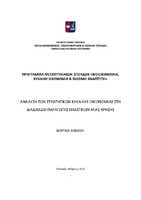Ανάλυση των στρατηγικών κυκλικής οικονομίας στη διαδικασία παραγωγής πλαστικών μιας χρήσης
Analyzing circular economy strategies in the production process of disposable plastic

Master Thesis
Συγγραφέας
Λυμάκη, Μαρίνα
Lymaki, Marina
Ημερομηνία
2022-03Επιβλέπων
Τσελεκούνης, ΜάρκοςΠροβολή/
Λέξεις κλειδιά
Βιωσιμότητα ; Βιώσιμη παραγωγή ; Επιχειρηματικά μοντέλα βιωσιμότητας ; Στρατηγικές βιωσιμότητας ; Η οικονομία των πλαστικών ; Παραγωγή πλαστικών ; Μηδενικά απορρίμματα / απόβληταΠερίληψη
Η κυκλική οικονομία ολοένα και κερδίζει την προσοχή σε ότι αφορά την ανάπτυξη κοινωνικής και οικονομικής ευημερίας, μειώνοντας ταυτόχρονα την ζήτηση σε πεπερασμένες πρώτες ύλες και ελαχιστοποιώντας τις αρνητικές επιπτώσεις σε διαφορετικούς τομείς όπως περιβάλλον κλπ. Η μετάβαση αυτή απαιτεί μια συστημική προσέγγιση η οποία θα βοηθήσει σε βελτιώσεις του υπάρχοντος συστήματος καθώς επίσης θα δημιουργήσει και νέους μηχανισμούς συνεργασιών μεταξύ θεσμών. Στον ιδιωτικό τομέα οι επιχειρήσεις έρχονται αντιμέτωπες με την πρόκληση και ευκαιρία να επεκτείνουν τις δραστηριότητες τους και να δημιουργήσουν αξία μεταξύ αλυσίδων προμηθειών πρώτων υλών που παρουσιάζουν ελλείψεις και εγείρουν θέματα περιβαλλοντικών επιπτώσεων οδηγώντας κατά συνέπεια σε αύξηση τιμών και αβεβαιότητα. Το επιχειρηματικό μοντέλο κυκλικής οικονομίας θα συνεισφέρει στην απεξάρτηση ανάπτυξης από την εκμετάλλευση πόρων που τείνουν να εκλείψουν, και θα επιτρέψει την οικονομική ανάπτυξη μεταξύ ορίων φυσικών πόρων. Με τον τρόπο αυτό οι επιχειρήσεις θα έχουν την ευκαιρία να καινοτομήσουν επιτυγχάνοντας την βέλτιστη απόδοση προϊόντων και υπηρεσιών με τους ελάχιστους πόρους. Μια από τις κύριες προκλήσεις της μετάβασης στο οικονομικό μοντέλο κυκλικής οικονομίας είναι η εφαρμογή στρατηγικών κυκλικότητας στην βιομηχανία των πλαστικών. Η νέα οικονομία των πλαστικών σκοπεύει να ξεπεράσει τους περιορισμούς που θέτονται από μη οργανωμένες και σταδιακές πρωτοβουλίες μεταξύ ενδιαφερόμενων μερών. Σκοπός είναι να δημιουργήσει τις κατάλληλες κατευθυντήριες για την δημιουργία καινοτομίας και μετάβαση των αλυσίδων αξίας προς την μεγιστοποίηση οικονομικού κέρδους αλλά και βέλτιστων περιβαλλοντικών αποτελεσμάτων.
Οι δυσκολίες αλλά και οι ευκαιρίες που προκύπτουν από τον σημερινό κύκλο ζωής των πλαστικών απαιτούν δραστικές αλλαγές στις οποίες η έρευνα και καινοτομία καθώς επίσης και η εφαρμογή των κατάλληλων θεσμικών πλαισίων, παίζουν καθοριστικό ρόλο. Ενώ τα πλαστικά αποτελούν ένα χρηστικό υλικό στο σημερινό σύστημα υπάρχουν σημαντικά μειονεκτήματα μεταξύ των οποίων οικονομικές απώλειες αξίας των υλικών, και περιβαλλοντικών επιπτώσεων. Είναι πλέον προφανές ότι η οικονομία των πλαστικών πρέπει να αλλάξει από ένα σύστημα που παράγει απορρίμματα βάση σχεδιασμού σε ένα σύστημα που διατηρεί στο μέγιστο την αξία και τα πλεονεκτήματα των πλαστικών. Η μακροπρόθεσμη λύση προς την επίτευξη της αλλαγής αυτής είναι μέσω πρωτοβουλιών καινοτομίας και έρευνας σε συνδυασμό με χάραξη πολιτικών που θα συνεισφέρουν αποτελεσματικά.


